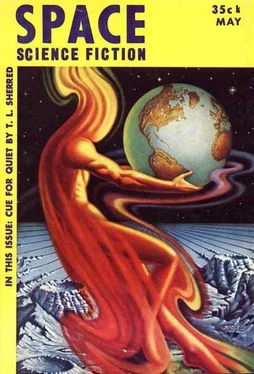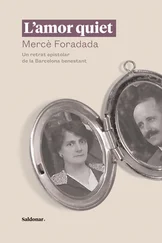Thomas Sherred - Cue for Quiet
Здесь есть возможность читать онлайн «Thomas Sherred - Cue for Quiet» весь текст электронной книги совершенно бесплатно (целиком полную версию без сокращений). В некоторых случаях можно слушать аудио, скачать через торрент в формате fb2 и присутствует краткое содержание. Год выпуска: 1953, Издательство: Space Science Fiction, Жанр: Фантастика и фэнтези, на английском языке. Описание произведения, (предисловие) а так же отзывы посетителей доступны на портале библиотеки ЛибКат.
- Название:Cue for Quiet
- Автор:
- Издательство:Space Science Fiction
- Жанр:
- Год:1953
- ISBN:нет данных
- Рейтинг книги:5 / 5. Голосов: 1
-
Избранное:Добавить в избранное
- Отзывы:
-
Ваша оценка:
- 100
- 1
- 2
- 3
- 4
- 5
Cue for Quiet: краткое содержание, описание и аннотация
Предлагаем к чтению аннотацию, описание, краткое содержание или предисловие (зависит от того, что написал сам автор книги «Cue for Quiet»). Если вы не нашли необходимую информацию о книге — напишите в комментариях, мы постараемся отыскать её.
Cue for Quiet — читать онлайн бесплатно полную книгу (весь текст) целиком
Ниже представлен текст книги, разбитый по страницам. Система сохранения места последней прочитанной страницы, позволяет с удобством читать онлайн бесплатно книгу «Cue for Quiet», без необходимости каждый раз заново искать на чём Вы остановились. Поставьте закладку, и сможете в любой момент перейти на страницу, на которой закончили чтение.
Интервал:
Закладка:
Over our coffee Helen pulled aside the kitchen curtain.
"I thought there was some reason I didn't wake up until ten. Look across the street," and she pointed.
In front of the Olsen's, a red panel truck, Chuck's Radio Service. Next door, in front of the Werner's, Harper Radio Parts. In the Smith's driveway, Rapid Radio Repair.
"What are you grinning at?"
"Me? I'm not grinning. Not at this time of the morning."
"Pete Miller, you were, too. Just like the cat that ate the fish."
"Canary, you mean."
"That's what I said. What's so funny?"
"Nothing," I said. "We just got a good night's sleep for a change. I like my sleep."
She harrumphed a bit, as suspicious as she usually is, and I went to the stove for more coffee. Over my shoulder I said, "Want to play a little cards tonight?"
She was skeptical about that. "At Art's, I suppose."
"Sure. Saturday night euchre tournaments."
"That noisy place? Nothing doing."
I told her the jukebox and the television set were out of commission and there'd be no noise she didn't make herself. She loved to play cards, I knew, and she liked Art. It was just the incessant roar that wore her down. I managed to talk her into it.
At Art's that night I listened with envy to the words that were used over the telephone when the jukebox gave up its ghost. I heard only Art's end of the conversation, of course, but I gathered that Art was being accused at the very least of sabotage. I changed the subject quick when I caught Helen trying to figure out the look I must have been wearing. Women get so they're pretty good at that after they've been married awhile. Art himself drove us home at closing time. Helen and Art's wife did all the talking, and I'm sure no one noticed I held my breath before every bar or house and Helen commented, as I fit the key into the front door, on the fact that the Olsens and the Werners and the Smiths all picked the same time to turn off their radios. "Very nice of them," she said, "considering it's Saturday night."
Now, I use two buses to get to work, transferring from the Harper bus to the Clairmount line, and it's a forty minute ride. For two days I fed my ego by holding my breath. I likely looked queer with a bursting red face, but no one said anything, at least directly to me. I wouldn't have cared much, anyway, because I didn't care much what happened; after all, wasn't I a benefactor to practically all the human race, the thinking part, that is? Wasn't it going to be nice to live in a world without punctured eardrums and hamstrung nerves? Wasn't it going to be good to be able to eat a meal in peace, to sip your ten or sixty-cent drink without having some moron with a nickel prodding your ulcer? I thought so.
Thursday, or maybe Friday, my careful searching of the daily papers found my tiny item buried back of the stock reports, with the labor news. I read it three times.
JUKEBOX WAR SUSPECTED.
–
An anonymous tip today told our labor reporter that serious trouble looms in the canned music industry. R. C. Jones, czar of Local 77, AFL, has issued orders to individually guard each machine serviced by his union. Jones had the classic "no comment" for publication, but it is an open secret that intra-union friction is high in the Harper-Gratiot area. Jones inferred that deliberate sabotage is responsible for the wholesale short-circuiting of jukeboxes and television sets. He named no names, but in an off-the-record statement threatened to fight fire with fire. "We're not," he snapped, "going to stand by and watch while goons ruin our livelihood. We will…. "
Now I was in a fix. They had to make a living. I'd forgotten that. A union man myself, who was I to break another's rice bowl? I could see no point in writing to this R. C. Jones. He'd think I was as crazy as they come. And the newspapers-I could imagine the reactions of a tough city editor. So, wrapped up in my own thoughts, I stepped off the curb a little ahead of the green, and I jumped just in time. I swore at the truck that almost got me, and it happened so quickly I wasn't prepared to hear or to see the motor of the truck throw a piston right through the rusted hood. White as a sheet the driver got out of his cab, and I crossed the street against the red light and lost myself in the crowd. This curve I was putting on the ball, it came to me then, wasn't limited to jukeboxes and noisy radios and burnt-out bearings. I had to watch my temper, or I was going to get someone in trouble. I was in trouble myself, and I had to get out of it.
By the time I got home I'd thought it over quite well. This-this power whatever it might be, was the McCoy. Why should I waste it when an honest dollar might be turned? A factory job in Detroit is just a factory job, and I might keep mine for the next forty years if I lived long enough through the noise and the dirt and the uncertainty and the model changeover layoffs every Christmas. The Olsens' radio disturbed my thinking and it took only a second. Either they were going to get tired of putting new tubes into that gadget, or play it softer, or move. I didn't care which.
So I used my wife's portable to type out a letter to Naval Ordnance in Aberdeen where my brother-in-law used to be stationed, telling them what I'd done, what I thought I might be able to do, and asking them for an opportunity to give them a demonstration. In return, I asked for a steady government job in a warm climate. Until I could arrange a certain demonstration, I went on, I could understand they might think me a crank, so I wouldn't at present sign my name. I suggested they pay close attention through the week of the fifth through the twelfth to the various press association dispatches, and I would arrange later, in my next letter, for a more personal show if they wanted to take it any further.
The fifth fell on a Saturday. Bright and early I was up to ride the bus downtown, changing to the Woodward line, ending up at Ferndale, all the time concentrating furiously and holding my breath as much as I dared. On the way back home I tried to work it a little differently. Probably no one else on the streetcar beside myself noticed there wasn't a single passenger car, truck or bus that passed us. Every car, as we sailed by, stalled and every traffic light we passed either turned three colors or blinked out completely. Most of the moving cars made it to the curb on their momentum. The others stayed where they were. When I got off in front of the City Hall, filthy old hulk that it is, the streetcar stayed immobile at the safety zone, it was a new PCC car, and the insulation poured smoke from under the wheels. Naturally there wasn't any moving traffic in back of it, or in front. I saw to that. Then I just strolled around Cadillac Square, bollixing up everything that occurred to me, from trucks to busses to traffic lights. You never saw such a verminous tangled mess in all your life. When the patrol wagons began to scream into the Square loaded with reinforcements for the helpless purple single cop at the Michigan intersection I let them get as far as the center of the street before I pinned them down. Even when I saw it later in the newsreels I couldn't believe it. Even Mack Sennett could have done no better.
I had to walk all the way out Gratiot to St. Antoine before I could find transportation home that wasn't walled off by screaming horns and haggard foot-patrolmen, and when I got off at my corner all Gratiot and Harper behind me was as clogged as Woodward. I even knocked out every red neon sign within two blocks of a traffic light. That one might keep a few pedestrians alive a little longer.
Helen was over at her mother's helping her hang drapes when I got home. The icebox gave me a cold Jumbo bottle and I turned on our little portable set. On every station the spot broadcast crews were hoarse. I spun the dials and finally concentrated on one announcer-you know who I mean-with the raspiest, most grating voice this side of a vixen file. Unfortunately, the housewives seem to like him, including Helen, and it's the housewives who have the radio on all day. I knew he was broadcasting from the roof studios of one of our highest buildings, and I took an enormous and perverted pleasure in holding my breath and thinking about the elevator system there. On second thought, I held my breath again and the station left the air in the middle of a word. I hope he liked the walk downstairs.
Читать дальшеИнтервал:
Закладка:
Похожие книги на «Cue for Quiet»
Представляем Вашему вниманию похожие книги на «Cue for Quiet» списком для выбора. Мы отобрали схожую по названию и смыслу литературу в надежде предоставить читателям больше вариантов отыскать новые, интересные, ещё непрочитанные произведения.
Обсуждение, отзывы о книге «Cue for Quiet» и просто собственные мнения читателей. Оставьте ваши комментарии, напишите, что Вы думаете о произведении, его смысле или главных героях. Укажите что конкретно понравилось, а что нет, и почему Вы так считаете.












